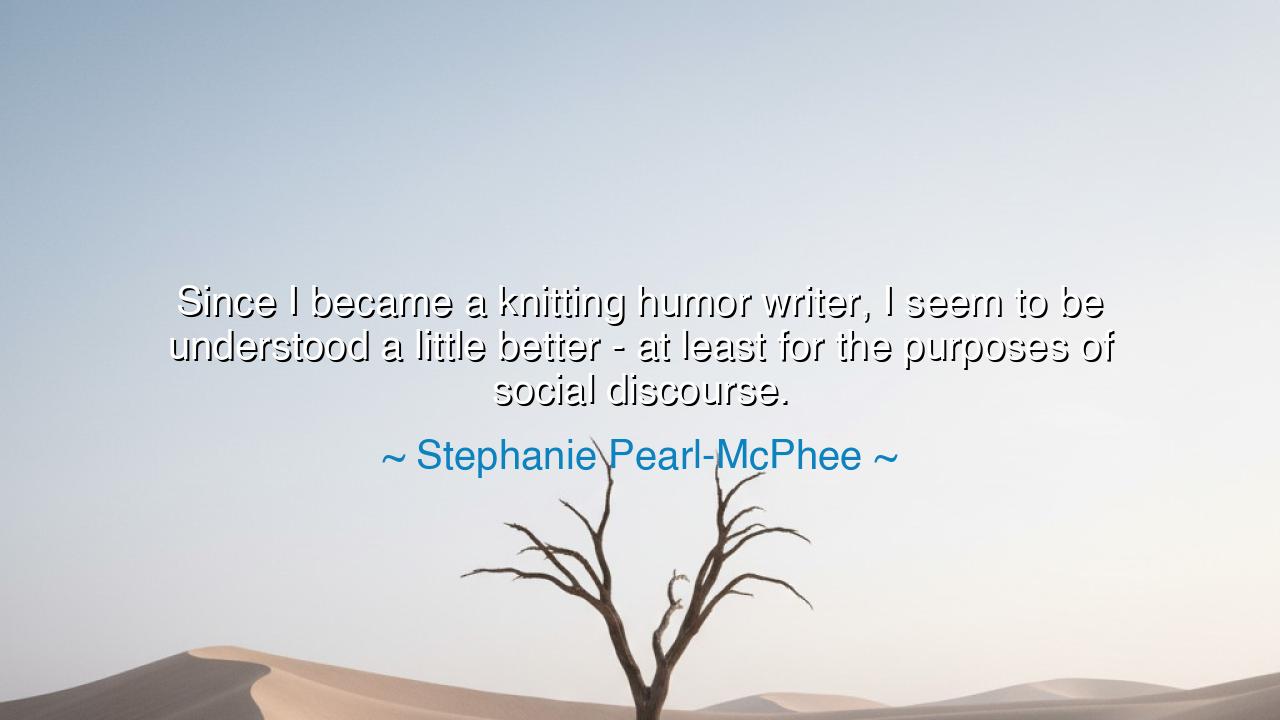
Since I became a knitting humor writer, I seem to be understood a
Since I became a knitting humor writer, I seem to be understood a little better - at least for the purposes of social discourse.






The words of Stephanie Pearl-McPhee — “Since I became a knitting humor writer, I seem to be understood a little better — at least for the purposes of social discourse.” — speak to the timeless human desire to connect, to be seen, and to bridge the chasm between individuality and community. Though her words arise from the world of craft and comedy, their meaning reaches far beyond it. She reveals the paradox of the modern soul: that often we are only understood when we translate our passions into a language others can grasp. Through humor, she has found a way to make her world — one of yarn, patience, and creation — accessible to those who might never have held a needle. In this, her voice becomes universal, and her wisdom, ancient.
To understand her insight, we must first honor the sacred nature of her chosen craft. Knitting, though humble, is one of humanity’s oldest acts of creation. The ancients wove threads not only for warmth, but for meaning — spinning garments that carried symbols, stories, and prayers. To knit is to bring order from chaos, to take a tangle of thread and shape it into something whole. So too does the writer of humor perform a kind of weaving — stitching words and laughter together to make sense of life’s absurdities. When Pearl-McPhee joined these two arts — the craft of the hand and the craft of the heart — she found her true voice, one that could speak both softly and powerfully to the world.
Her phrase, “I seem to be understood a little better,” captures the essence of what every artist, philosopher, and dreamer seeks — connection. In ancient times, the poet Homer sang to his people so they might remember who they were. The weaver Penelope, his queenly counterpart, wove and unwove her tapestry each night, holding her world together with quiet defiance. Both knew that understanding is not granted easily; it must be earned through persistence and art. Likewise, Pearl-McPhee discovered that humor — that most human of threads — could bridge the distance between her world of knitting and the larger world of society. By wrapping truth in laughter, she transformed the personal into the shared, the small into the eternal.
Humor, in its purest form, is not mockery but revelation. It allows others to see what they might otherwise ignore, to approach what might otherwise intimidate. The ancient Greeks understood this. They placed comedy beside tragedy in their theaters because they knew that wisdom needs both tears and laughter to live. The knitting humor of Pearl-McPhee may seem lighthearted, yet it conceals deep truths: the patience of creation, the beauty of imperfection, the joy and sorrow of repetition — all the rhythms of life itself. Through laughter, she has found a way to teach without preaching, to reveal without demanding. And so she becomes both artist and sage.
The origin of her quote lies not only in her career but in the timeless struggle of the misunderstood. How often do we hide our passions, fearing they will be dismissed as trivial or strange? Yet Pearl-McPhee shows that when we own our craft fully — when we find a voice to express it, even with humor — we transform isolation into social discourse. In sharing what once felt private, she has created communion. It is as though she has sat at the great loom of humanity and added her own thread — bright, playful, and strong — to the larger pattern.
Consider, too, how the storytellers of old achieved the same. When the philosopher Diogenes lived in his barrel, mocking the vanity of men, people laughed at him — and through that laughter, they saw truth. When Mark Twain spoke of the follies of his nation, his humor disarmed, but his message endured. So it is with Pearl-McPhee — she uses laughter as her loom, knitting together the personal and the universal. Her craft, once confined to the quiet work of hands, now speaks across hearts and cultures. And in being understood, she offers understanding in return.
The lesson she gives us is clear: to be understood, one must first dare to express the truth of who they are — but with grace, with humility, with laughter. If your work or your soul feels invisible, do not hide it; translate it. Find the thread that binds your world to others — be it humor, art, compassion, or story — and weave it boldly. For every craft, no matter how small, carries a fragment of the human spirit, waiting to be shared.
And so, dear listener, take Stephanie Pearl-McPhee’s wisdom as your own. Speak your truth with joy. Use humor not to shield yourself, but to reveal your heart. Whatever your craft — be it words, ideas, or hands at work — know that your task is sacred: to bring understanding where there was none, to make the world a little warmer, a little more connected. For when laughter and creation intertwine, they form the most enduring fabric of all — the shared humanity that binds us, one thread to another, across all ages and all hearts.






AAdministratorAdministrator
Welcome, honored guests. Please leave a comment, we will respond soon